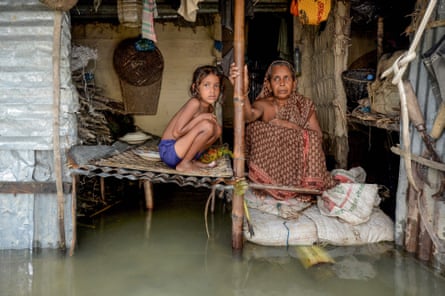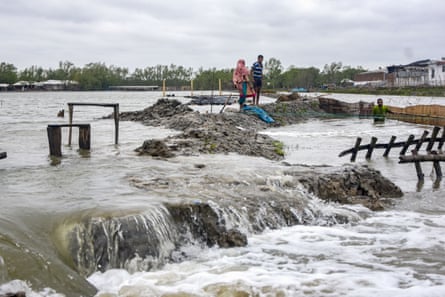Bangladesh could be plunged into a humanitarian crisis as it undergoes the most prolonged monsoon flooding in decades while it is still recovering from the effects of super-cyclone Amphan.
Despite the UN has lauding its new initiatives for early intervention aimed at preparing communities for crisis, 550 people have been killed and 9.6 million affected by the disaster in Bangladesh, Nepal and north-eastern India, according to the International Federation of the Red Cross and Red Crescent.
Bangladesh’s ministry for natural disasters has estimated that a third of the country is already underwater, with heavy rains set to continue until the end of July. The UN has estimated that this flooding could be the most protracted since 1988.
Rezaul Karim Chowdhury, executive director of the Bangladeshi NGO Coast, said the country was far more prepared for flooding than in the past, but that populations in flooded areas might end up in dire need because of a combination of existing localised and national crises.
He said incomes had already been hit by the government’s closure of 25 state-owned jute mills, mostly in northern areas that have been flooded, and by the Covid-19 pandemic.
“The country has been locked down for four months and that has had a serious impact. Forty per cent of rural income was coming from urban areas and then suddenly labourers and rickshaw pullers weren’t sending money home,” said Chowdhury.
“Almost a third of the population has dropped under the poverty line. This will have an impact on food security and purchasing power, this is a critical situation we have to overcome.”
He said local organisations had exhausted funds responding to the pandemic so the UN and international organisations would need to step in, especially to support farmers whose crops may be damaged before the August rice harvest.

The UN said it had been trying to pre-empt damage to livelihoods by predicting where support needed to be sent ahead of time, using advances in data and forecasting analytics.
That had allowed the release of relief worth $5.2m (£4m) from its reserve fund for humanitarian emergencies to counter severe flooding over the past week in the form of cash, hygiene and health kits, and equipment to protect farmers’ materials from water damage.
The UN under-secretary-general for humanitarian affairs and emergency relief coordinator, Mark Lowcock, said the organisation should no longer be taken by surprise when disasters hit.
“Doing something before crises hit can save more lives and costs less money. Plus it’s far more dignified for the people we’re helping,” he said.
“If we know a flood is about to hit, why wouldn’t we give river communities the means to get themselves, their livestock and their tools out of harm’s way before the deluge comes, instead of waiting until they’ve lost everything, then try and help?”
Sheikh Rokon, founder of the campaign group Riverine People, said the monsoon was essential to life in Bangladesh, recharging water levels and giving life to seasonal wetlands, but that environmental changes were making life harder for communities.
“River erosion makes the situation worse. They lose everything but hope and have to struggle for days. This year, riverine communities across the Brahmaputra and Teesta river basins are facing severe erosion,” he said. “A very small riverine community, the water Gypsy, live in the rivers, on boats. Floods makes their life and livelihoods harder.”

Rokon said communities usually had little time to prepare, which usually involves moving their belongings to areas protected by embankments.
The World Food Programme’s executive director, David Beasley, said improving planning to act on forecasts would help families in the long run.
“Year after year, floods devastate Bangladesh. The waters not only swallow up homes and lives but with them progress and hope for the Bangladeshi people,” said Beasley. “I cannot stress enough how important it is to equip communities to prepare and protect themselves against such disasters.”
